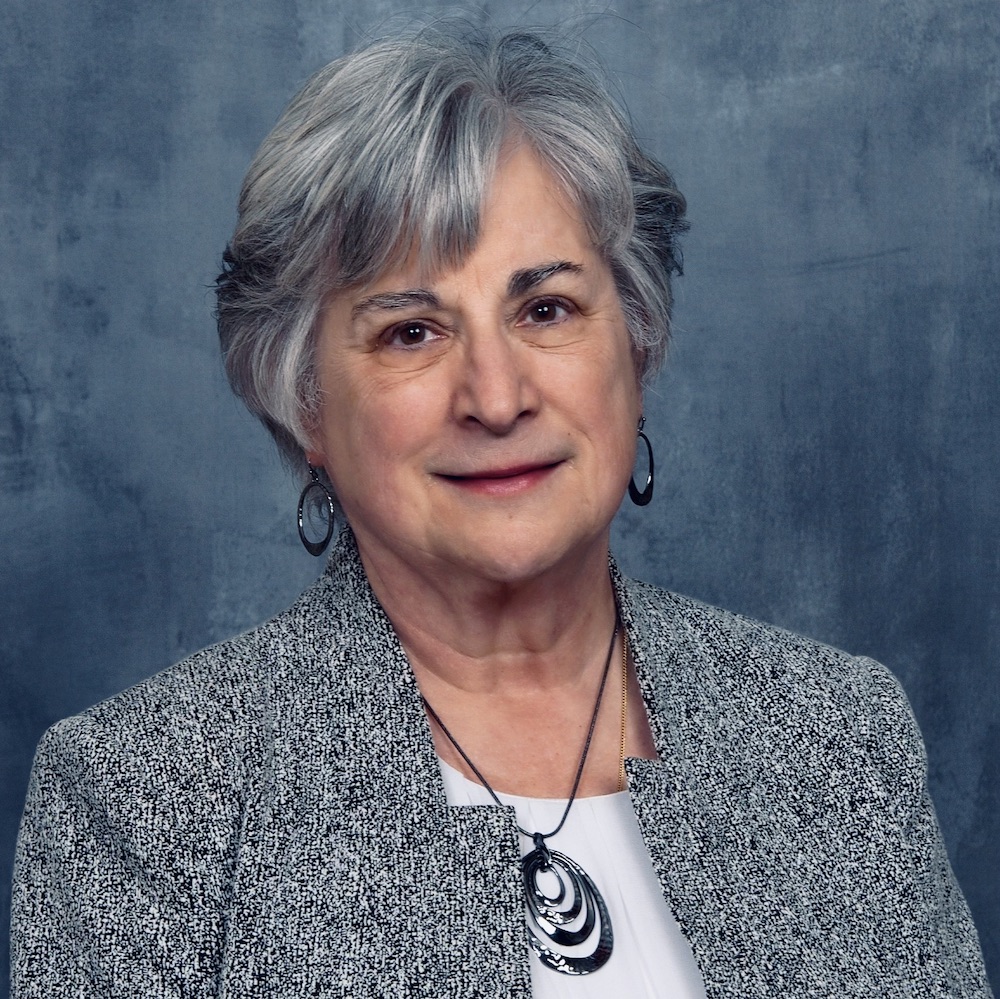|
Getting your Trinity Audio player ready...
|
[Editor's Note: This is the second in a series of columns on Dr. Smith's three-week visit to Uganda, where she spoke at six seminaries.]
As I mentioned in the first column of this series, whereas in the United States I have to convince Catholics that homosexuality violates God’s plan for sexuality—a truth made known to us both through natural law and Scripture, in Uganda, I had to explain the phenomenon of homosexuality (I focused on male homosexuality) and advocate for respect for their fundamental human rights and for the need for compassion. It was not the case that Ugandans were homophobic; indeed, they have given little attention to the issue. Again, the topic was chosen not because homosexuality is a significant problem—yet—in Uganda, but so that it does not become one.
I told the seminarians that before coming I had tried to familiarize myself with Uganda, but I certainly didn’t achieve a deep understanding of Ugandan culture or the Ugandan Church or what might be the problems therein. What I do know is that the culture and the Church in the U.S.—and virtually all the West—are in deep trouble. One of the causes and signs of the extent of the corruption is the widespread acceptance of homosexuality.
That is not altogether news to Ugandans. In fact, I had a notable conversation with a Ugandan woman in a rather remote area of Uganda. She asked me how things were in America. I responded that things are a mess and that we no longer respect Christian values. She said “I knew it.” She then asked how things are in the Church, and I answered: “It’s a mess; the sex abuse crisis and cover-up, among other things, has caused great harm.” She said, “I knew it; I pray for America every day.”
Orthodox. Faithful. Free.
Sign up to get Crisis articles delivered to your inbox daily
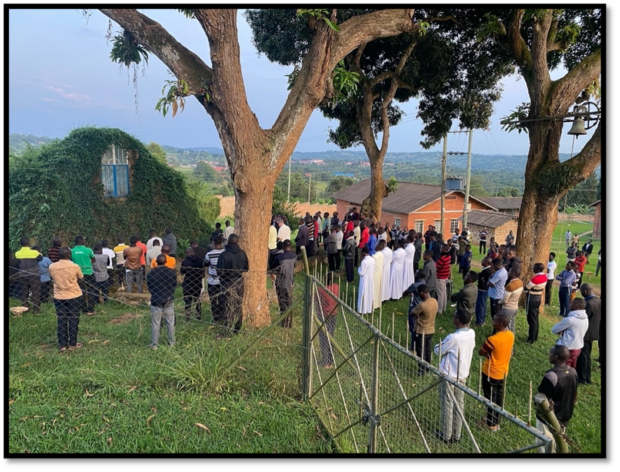
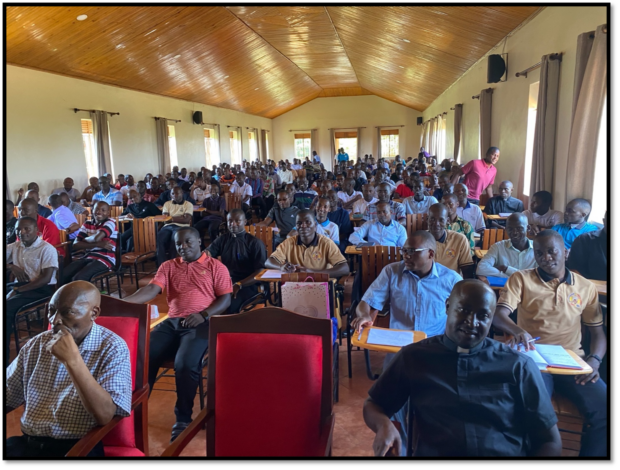
To underline that I did not think homosexuality is the foremost problem in Uganda, I began my talks by speaking not about homosexuality but about what is a greater problem in Uganda: fatherlessness (along with a related lack of respect for the dignity of women). Sadly, in some of the publications about poverty in Uganda, such as one by UNICEF, fatherlessness goes unmentioned as a cause of deprivation for children. It is not easy to find solid numbers about fatherlessness in Uganda—Pew Research gives 10 percent as the number for Uganda and 23 percent—the highest in the world—for the U.S. Those numbers are for single-parent households with children under 18. (While some of those single-parent households may be headed by men, I think it is safe to use them to get a sense of the absence of fathers in the home.)
Uganda has a lot of orphans—3 million or so. I told my audience that the U.S. is suffering terribly from fatherlessness as well as children being raised in households with unmarried parents or parents who have divorced and remarried, environments which are often filled with high levels of stress. I urged the seminarians to make a major focus of their homilies and the formation of their flock the importance of men accepting the responsibilities of being a father. I urged the seminarians to make a major focus of their homilies and the formation of their flock the importance of men accepting the responsibilities of being a father. Tweet This
They need to drum it into their own heads and the heads of their flock that men should have sexual relations only with their wives and should take an active role in the care and education of their children. I emphasized that priests should be examples for the men of their parishes and remain chaste. (I sensed some squirming when I made these remarks.)
The more I think about it, the more I think that if I return, I should speak about the role of fathers in the family—which would also necessarily involve speaking on the treatment of women. I would need to get a better read on the situation in Uganda, but from what I have read, most parenting is left to the mother, who is not considered on par with her husband in making a contribution to the household. The Catholic Church in Uganda is working to fortify the family; obviously, I would need to coordinate closely with that effort.
When I began to speak on the main topic of homosexuality, I quickly reviewed the natural law explanations for the wrongness of homosexual acts and pointed out the scriptural condemnations of homosexual acts. They enjoyed the graphic below, meant by its creators to support “sexual differences” but which works directly against the message that all sexual unions are the same:

Then I moved to the challenging part of my presentation: that we need to have compassion for those who experience same-sex attraction. My chief source was the Catechism of the Catholic Church. While the Catechism speaks to the issue of homosexuality only briefly, what it says provides a marvelous teaching tool, especially section 2358:
This inclination, which is objectively disordered, constitutes for most of them a trial. They must be accepted with respect, compassion, and sensitivity. Every sign of unjust discrimination in their regard should be avoided.
I made the usual qualifications about “objectively disordered,” which refers to the “inclination” not to the very essence of the person: people are not homosexual or gay but, rather, male or female persons who have objectively disordered inclinations. But what I precisely wanted them to note were other remarks, such as the claim that “This inclination…constitutes for most of them a trial.” For some reason, too many people think that those who have homosexual inclinations have chosen to have those inclinations.
I have yet to read or hear the story of someone who has made such a choice. The stories I hear and read indicate that a person with SSA “finds” himself with such desires and does indeed—often, if not always—find them to be a trial. (I sometimes think that nearly every homosexual would choose to be heterosexual if he thought he had the choice.) Thus, the Catechism mandates: “They must be accepted with respect, compassion, and sensitivity.” If they were fully responsible for their homosexual inclinations and acts, why counsel “respect, compassion, and sensitivity”? (The Catechism does not counsel this for thieves or murderers, for instance.)
The Catechism also states that there should be no “unjust discrimination” against those with homosexual inclinations. I explained that all persons have a right to food, shelter, an education, and work, for instance, and a right to have their fundamental human dignity respected. I also noted that homosexuals do not have a right to marriage, for instance, nor should they be seen as a privileged minority whose desires (such as a wedding cake) should trump another person’s right to live in accord with their religious convictions.
See this graph on sexual orientation in the U.S. by generation:
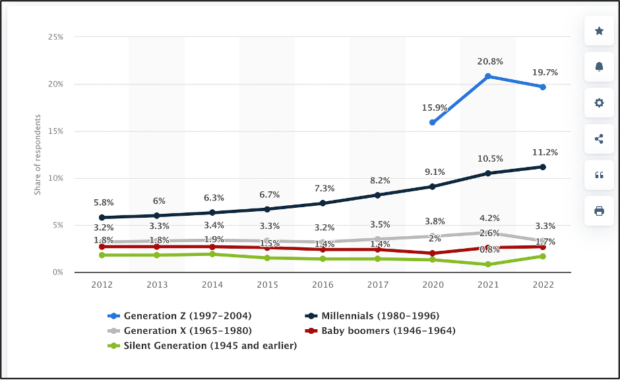
See, also, this graph on the attitude of Americans toward same-sex unions:
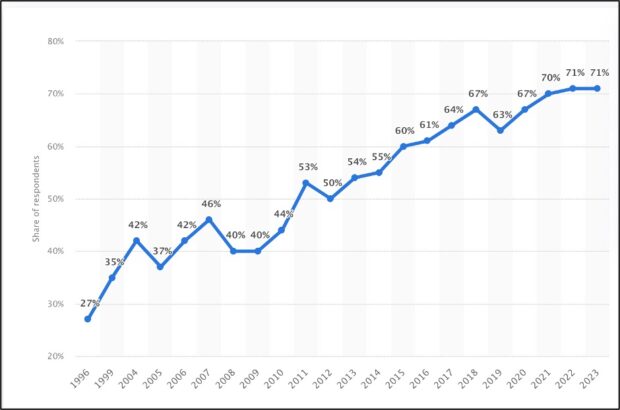
I explained to them that, in the West, there is no respect for natural law as a basis for morality; that in many countries, speaking of homosexuality as wrong counts as hate speech; that all objections to homosexuality are thought to be the result of homophobia or hatred of homosexuals; that support for homosexual marriages, at one time virtually negligible, has grown to nearly 75 percent. People believe homosexuals are born that way; that the Church hates those who are LGBTQ+; that it is impossible to be happy without an active sexual life. The fact that historically no more than 2 percent of people identified as homosexual and now 23 percent of millennials identify as LGBTQ+ fortified my fear that homosexuality is taking over.
In Uganda, on the other hand, although there is a healthy understanding of the wrongness of homosexual acts, there is little understanding of its causes and the proper Christian response to homosexuals. In Uganda, if parents discover their son or daughter is a homosexual, they are likely to sever all contact with their child. As I told the seminarians, this means they are essentially shoving their child into the gay community, the only place they are likely to find love and acceptance.
The lack of understanding, to a great extent, is the result of the absence of visible homosexuality in their culture. As I mentioned in my first column, one rector acknowledged that when he was a student, he didn’t understand why the topic was even covered.
Section 2357 of the Catechism notes that the “psychological genesis [of homosexuality] remains largely unexplained.” In 1992, when the Catechism was written, that was perhaps largely true, but it seems that most responsible psychologists, while noting that there is no single cause, have identified a large number of factors that contribute to a person’s acquiring desires to have sex with a person of the same sex.
A significant proportion of those with SSA have been sexually abused, or exposed to homosexual porn early in life, or been emotionally abused or neglected by their fathers. Virtually every male with SSA has “father issues” and virtually all doubt whether they are masculine “enough.” Among other less determinative contributing factors are slightness in size, low athletic ability, poor body image, and failure to live up to the masculine exploits of their brothers. But rarely if ever can it be said that a young man chooses to be homosexual; something—or many things—have happened to a young man that disordered his sexual appetites.
In the next column, I will report on what I told the seminarians I have learned about the causes of same-sex attractions and how those who experience same-sex attractions can easily come to hate themselves and to despair of ever being able to live chaste lives.
Support Ugandan Seminarians!
A new propaedeutic year is being established to provide better formation for Ugandan seminarians. Please click on this link to read about the program and how to donate if you are interested and able.
